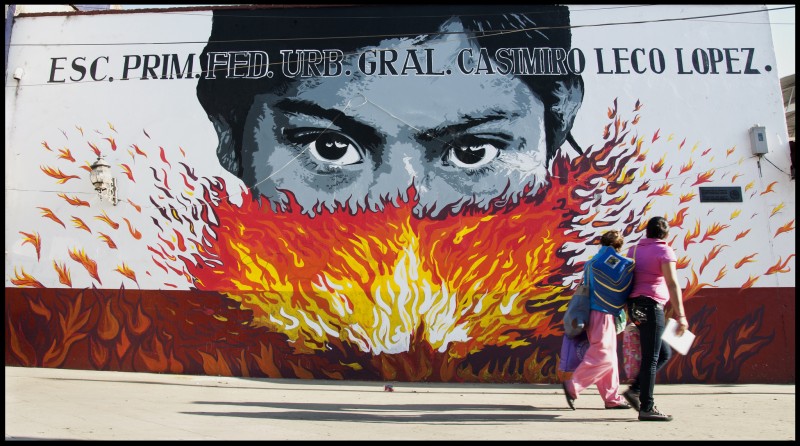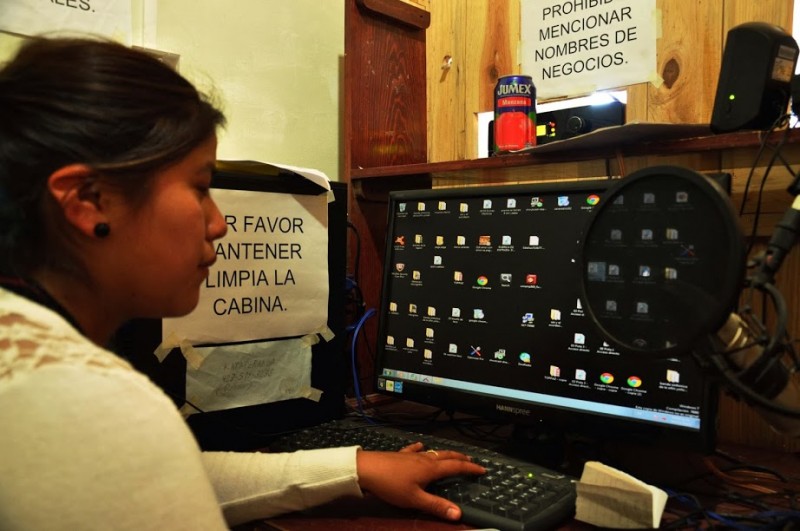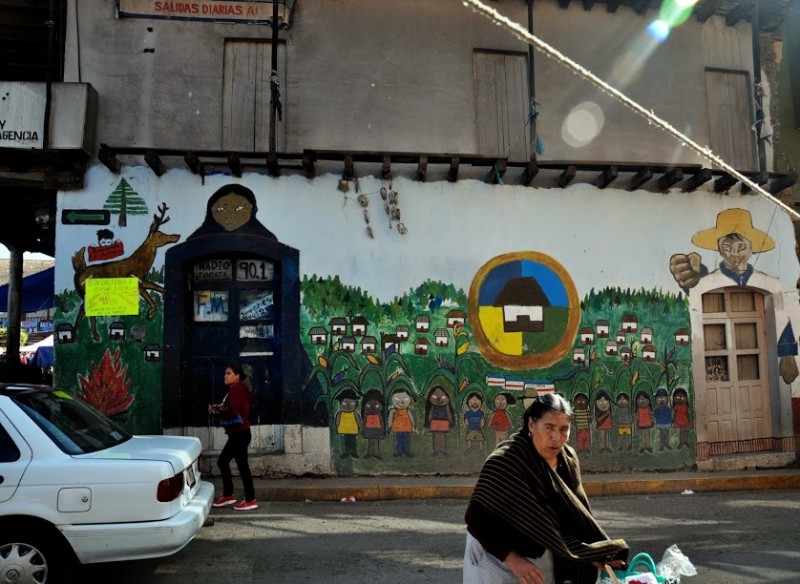
Mural in Cherán. Made by the collective DEXPIERTE – Colombia, on the third anniversary of the communal government. Photograph DEXPIERTE collective- Colombia. Published with permission.
This post is the continuation of a two-part series about Cherán's self-government and the development of its media. In a previous post we reviewed the history of strength and solidarity of Cherán K'eri. This time, we'll explore the role that community media has played in their autonomy project.
Radio Campfire, one of the main media outlets in Cherán in western Mexico, was born only a few days after the indigenous community took up self-governance and self-defense in 2011 in the face of organized crime looking to exploit the area's resources.
In the words of young Angelica, who actively participates in the radio station:
Surgió a través del levantamiento que tuvimos nosotros como comunidad, defendiendo nuestros bosques. La radio surge porque llevamos la palabra acompañada con la música, pensando también en que es el arma más importante que nosotros como pueblos indígenas tenemos para defendernos y para dar a conocer nuestra lucha, nuestras problemáticas.
It came out of the uprising that we had as a community, defending our forests. The radio came about because we set our words to music, thinking that this weapon is the most important thing we indigenous towns have to defend ourselves and let people know our fight and our problems.
Kuri Morales, another young person involved in the project, says the radio station came to be thanks to the Jóvenes unidos por Cherán (United Young People for Cherán):
Era muy necesario este proyecto, ya que en nuestra comunidad contábamos con una radio que formaba parte de la CDI [Comisión Nacional para el Desarrollo de los Pueblos Indígenas] del gobierno federal [que] nunca dio difusión a nuestro movimiento […] Para nosotros fue muy necesario crear nuestra propia radio para dar difusión a nuestro movimiento tal y como era, ya que tanto los medios de comunicación, radio y televisión, no daban la información […] Siempre se distorsionaba… [Por ello] decidimos crear nuestra propia radio.
This project was really necessary, since our community had a radio that's part of the National Commission for the Development of Indigenous People of the federal government that never spread the word about our movement. […] For us, it was really important to create our own radio station to spread information about our movement as it is and was, given that so many forms of media, radio and TV, didn't […] It always was distorted… [Because of that] we decided to create our own radio station.

Young radio announcer from Cherán Radio. Photograph Collective DEXPIERTE – Colombia. Published with permission.
Having started with a transmitter of only 15 watts, Radio Campfire now has improved equipment that allows nearby towns to listen, and is constantly working to broaden the station's transmission capacity. According the radio team, they plan to also expand to Internet radio.
Colectivo DEXPIERTE – Colombia, a cultural and artistic experiment out of Colombia, has also reported on the Cherán community. For the collective, this group is a symbol of autonomy and strength. They explain:
Radio Fogata se crea con un transmisor, un computador, dos micrófonos, una conexión a internet, una antena y unos cuantos chavos que sin saber nada de medios de comunicación se atrevieron a encender la llama de la palabra brindando su tiempo de manera voluntaria para aportar al proceso organización comunitaria.
Casas y negocios comerciales sintonizan el 101.7 FM para escuchar Radio Fogata […] Entre música P’urhépecha, ranchera, banda, rock, pop y otros géneros hay programas con contenido sobre las mujeres, las drogas, los derechos, lo que pasa en la comunidad y la lucha de otros pueblos hermanos.
Campfire Radio is created with a transmitter, a computer, two microphones, an Internet connection, an antenna and a few guys who without knowing anything about media dared to light the fire of the community's words, giving their time voluntarily to contribute to the community organization process.
Houses and commercial businesses tune into 101.7FM to listen to Campfire Radio […] Between P’urhépecha [indigenous Mexican music], ranchera, banda, rock, pop and other genres, there are programs with content about women, drugs, rights, what happens in the community and the struggle of other brother towns.
The Campfire Radio page on Facebook reports on numerous political and cultural demonstrations, such as the activities of other alternative media and communities in the region. For example, this month was the anniversary various events that led to the eventual political emancipation of Cherán. Similarly, Campfire Radio gives echo to the movements in solidarity with the missing Ayotzinapa students and calls attention to attacks on other community media in the country.
From radio to television
As part of its project to combat mainstream media's misinformation about and marginalization of indigenous communities, Jóvenes unidos por Cherán together with the group Los Tejemedios launched a new project in October: Cherán TV.

Entrance to the community cabin installations of Cherán Radio and Cherán TV. Photograph by DEXPIERTE collective [Colectivo DEXPIERTE]- Colombia. Published with permission.
A group of five young men read Cherán TV‘s main principles in one of their YouTube videos:
Esta TV comunitaria es para fortalecer nuestra autonomía y para apoyar nuestra organización. En esta TV comunitaria, no hay discriminación, cero religiones institucionales, sin comerciales, sin partidos políticos ni grupos de poder. ¡Hagamos la tele entre todos!
This community TV is strengthened by our autonomy and to support our organization. In this community TV, there is no discrimination, zero institutional religions, no commercials, no political parties, or power groups. We create TV together!
In their effort to preserve their history and customs and give voice to the community, everyone is given time slots: women, men, girls, boys, young and old of both sexes. Cherán TV shares information about self-government, community elections, cultural manifestations, and audiovisual experiments. The channel also connects with other community media outlets nearby and shares information of interest for alternative media. See an example of Cherán TV's coverage below, a feature about Día de los Muertos (Day of the Dead) celebrations:
Their community blog is another example of how they create awareness of their indigenous p'urhépecha culture. There, they publish work completed by other media and also promote cultural community activities. The blog also includes a small forum though which visitors can leave messages that, for example, encourage and support the community.
Community media like the kind found in Cherán face many challenges, including technical limitations. Nevertheless, these community news outlets work every day to fulfill their mission of spreading the word about their community's independence and culture. Campground Radio and Cherán TV are part of a movement that seeks to offer an alternative to traditional media's narrative and defend the dignity of the population. Their efforts have certainly lit a fire, one that doesn't show any sign of being extinguished any time soon.








2 comments